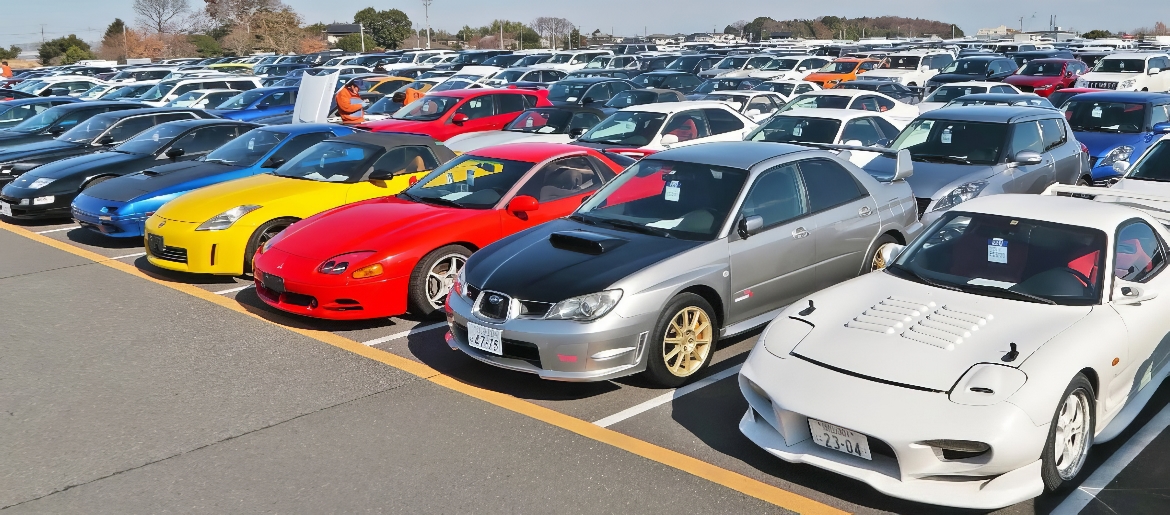How to buy a car at an auction in Japan and not regret it
Japanese car auctions are probably a unique phenomenon in their own way, which originated and reached incredible proportions in this technologically advanced country with ancient traditions. And I am not surprised that it is here that buying and selling used cars has turned into a real art, shrouded in a special atmosphere and requirements for both the seller and the buyer. What’s the best way to buy a car you like that’s up for auction in Japan and then not regret your purchase for the rest of your life?
The content of the article
- 1 The evolution of the system for selling cars at auctions in Japan
- 2 What are the features and advantages of Japanese car auctions?
- 3 The process of participating and purchasing at Japanese car auctions
- 4 Types of cars at Japanese auctions
- 5 Technical condition of cars at auctions
- 6 Practical tips for a successful purchase
- 7 Related video: Japanese auto auctions from the inside (USS Tokyo)
The evolution of the system for selling cars at auctions in Japan
The origins of Japanese car auctions go back to the middle of the last century, when the country began to rapidly grow in motorization, because every year the number of cars requiring resale steadily increased, which raised the question of creating an effective system for their sale.
And in the 1960s, the first professional auction sites began to form, specializing exclusively in the sale of used cars. The scattered efforts gradually transformed into a full-fledged industry with clear rules, standards and associations of auction houses.
What are the features and advantages of Japanese car auctions?
The great news is that Japan today boasts an extensive network car auctions, which are distinguished by a number of unique features inherent specifically in Japan and no other country more.
Features of the car auction system in Japan
- Strict rules for assessing the technical condition of cars using a detailed grading system.
- The highest level of organization and transparency of trading, eliminating the possibility of fraud.
- Access to the widest range of cars - from budget to exclusive models.
- The ability to participate and purchase remotely for customers from anywhere in the world.
- Developed infrastructure for delivery and customs clearance of purchased vehicles.
It is thanks to their unique advantages that Japanese car auctions have gained popularity far beyond the country's borders and have become one of the main channels for the supply of quality used cars around the world.
The process of participating and purchasing at Japanese car auctions
Pre-registration is required to bid at Japanese auto auctions. This process is quite simple and in modern realities can be carried out remotely via the Internet. After successfully completing the registration procedure, participants receive a unique ID, which allows access to online auction catalogs and the ability to place bids.
How to choose and evaluate a car at auction
Japanese auctions provide maximum information about the cars up for auction. The catalogs provide detailed descriptions indicating technical characteristics, photographs from different angles and an assessment of condition according to a strict grading system.
The assessment system involves a visual inspection of the car by qualified inspectors and assigning it a certain score (grade) in accordance with the existing defects and damage. The starting price depends on the specified grade and determines the feasibility of betting on a particular lot.
Steps for purchasing and delivering a car
After successfully winning the auction, the purchase process begins, which includes a number of logical steps.
Stages of making a purchase at an auction
- Payment of the full price of the vehicle (sale price plus all auction fees).
- Arranging delivery to the port of loading.
- Customs clearance in the destination country.
- Organization of transportation to the final destination.
Experienced assistance companies take care of all this hassle, providing clients with a full range of turnkey services. An example of such intermediary activities for working with auctions and delivering cars from Japan throughout the country can be found in the source https://batareyka25.ru/ and understand what kind of cars we are talking about and in what price range is what is right for you.
Types of cars at Japanese auctions
The range of cars presented at Japanese auctions is truly impressive. Here you can find cars of almost any world brand - from Asian to American and European. However, the undisputed leaders are cars of our own, Japanese production.
Most common brands
- Toyota (Corolla, Prius, RAV4, Land Cruiser, etc.)
- Nissan (Tiida, Note, X-Trail, Skyline, etc.)
- Honda (Fit, Civic, CR-V, Accord, etc.)
- Mazda (Demio, Axela, CX-5, etc.)
- Suzuki (Swift, Wagon R, etc.)
- Mitsubishi (Lancer, Outlander, Pajero, etc.)
- Subaru (Impreza, Forester, Legacy, etc.)
These cars are highly regarded due to their reliability, efficiency and availability of spare parts. At the same time, they are distinguished by their low cost on the secondary market.
But don’t think that auctions offer exclusively mass-produced models. Exclusive and even rare cars regularly appear at auctions, which are in particular demand among collectors and connoisseurs.
Relatively rare car brands
- Sports cars (Nissan GT-R, Toyota Supra, Mazda RX-7, Honda NSX)
- Classic Japanese cars (Nissan Cedric, Toyota Crown, Nissan Laurel)
- Limited and special versions of popular models
- All-wheel drive SUVs (Land Cruiser, Mitsubishi Pajero, Nissan Patrol)
Prices for such lots are significantly higher than the market average, but at auctions there is always a chance to make a truly profitable purchase.
Budget cars at auctions deserve special mention - an ideal choice for those who want to save money. It offers a huge range of inexpensive vehicles of various classes: compact city hatchbacks and sedans, minivans, pickups and SUVs.
With the right approach, at Japanese auctions you can find a reliable car up to 10 years old with minimal mileage at a very attractive price - from 1000 to 4000 US dollars. The main thing is to thoroughly study the description and grade to identify potential risks.
Technical condition of cars at auctions
The key advantage of Japanese car auctions is a thorough inspection of the technical condition of the cars put up for auction. The industry has a strict, standardized assessment system that includes several levels.
At the highest level is the AMMA methodology, used by the largest auction houses to certify the most valuable premium cars. It involves a thorough inspection, testing on special stands and assignment of one of five grades from S (like new) to R (repair required).
For mass-produced models, systems with a 7-level rating from 7 (excellent condition, no defects) to 1 (car after a serious accident) are more common. A certain grade is marked directly on the windshield of the inspected car.
Comparison table of popular grading systems in Japan
| System | Levels | Application |
| AMMA | 5 (SR) | Premium/luxury cars |
| AUCNET | 7 (7-1) | Mass cars |
| USS | 7 (7-1) | Mass cars |
| HAA | 7 (7-1) | Mass cars |
Thanks to such careful control, the risk of purchasing a low-quality or secretly repaired car is significantly reduced. However, to increase the chances of a successful purchase, it is recommended to adhere to certain rules.
General purchase rules
- Be interested only in cars with high grades 5-7.
- Carefully study the descriptions and photos.
- If possible, order additional independent diagnostics and examination.
- Give preference to official dealer cars with a transparent history.
There are also important points that you should pay attention to when choosing, even on well-certified and, at first glance, rechecked cars several times.
Important Details
- Mileage and age of the car
- Interior appearance and condition of upholstery
- Possible touch-ups and signs of repair
- Equipment and functionality of options
- Availability of original keys and documentation
Only by assessing the whole range of factors will it be possible to form a real idea of the condition of the car you like and make a decision on the optimal rate.
Practical tips for a successful purchase
Auction Bidding Strategies Bidding at Japanese car auctions is different from the public auctions we are used to in other countries. Here, bets are accepted behind closed doors, and the winner is the participant who offers the maximum price. It is clear that successful purchases require a certain strategy.
The most effective approaches to auctions
- A sober assessment of the condition of the car and its market value at the time of trading.
- Calculation of the maximum allowable purchase price, taking into account all associated costs.
- Placing your first bid in the middle or lower end of your desired price range.
- Gradual increase in rates at intervals of several hours/days.
- Bid the maximum allowable price immediately before the auction closes.
Another important point is the correct assessment of the real cost of the selected car.
Correct cost estimation
- Age, mileage, equipment, popularity of the model on the secondary market
- Availability and scope of repair work, degree of wear
- Cost of customs clearance and delivery to the buyer’s country
- Costs for spare parts and service in the near future
Experienced auction participants also recommend carefully monitoring the dynamics of bids for specific lots. If the competition is too sluggish, there is a high probability that other participants saw flaws in this car and decided not to overpay.
Finally, in the final stage it is extremely important to thoroughly check all documentation and avoid mistakes when exporting a won car from Japan. To do this, many experienced buyers turn to the services of professional reseller companies who take care of all the hassle and worries.
Other useful tips
- Order additional car diagnostics if in doubt
- Choose auction sites with a good reputation
- Take into account current exchange rates and fluctuations in demand
- Don't chase exclusive lots without a clear plan
- Consider purchasing at auction as a business process
By following these simple recommendations, even a novice participant can significantly increase his chances of success and purchase an excellent car from Japan on almost ideal conditions. And finally, a video that will undoubtedly be of interest to those who are interested in the topic itself in principle.


















